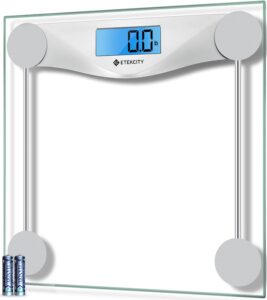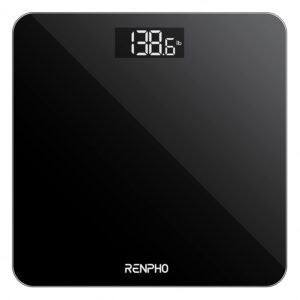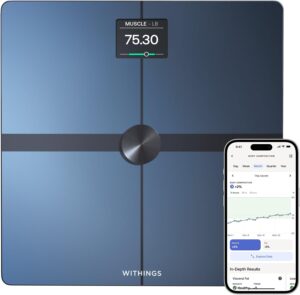How Long Should Bathroom Scales Last?

How Long Should Bathroom Scales Last? A Guide to Longevity and Care
In today’s health-conscious world, bathroom scales are more than just a tool for tracking weight—they are essential companions on your wellness journey. Whether you’re shedding pounds, maintaining a healthy weight, or simply keeping an eye on your health metrics, the humble bathroom scale often becomes part of your daily routine.
But if you’ve ever wondered, “How long should bathroom scales last?”, you’re not alone. It’s a common question for anyone looking to get the most out of their investment. In this comprehensive guide, we’ll explore the expected lifespan of bathroom scales, factors that influence their durability, tips to extend their life, and more.
By the end of this article, you’ll have a deeper understanding of how to choose, maintain, and care for your bathroom scale, ensuring it serves you accurately and effectively for years to come.
Understanding the Lifespan of Bathroom Scales
Average Lifespan of Bathroom Scales: 3 to 10 Years
The lifespan of bathroom scales varies depending on the type of scale, how frequently it’s used, and how well it’s maintained. On average, bathroom scales last anywhere from 3 to 10 years. That’s a wide range, but certain factors—such as build quality, technology, and care—play pivotal roles in determining how long a scale will last before it starts showing signs of wear.
Let’s break down the different types of bathroom scales to see how their lifespans compare:
Mechanical Scales:
Mechanical scales, often recognized by their old-school, analog dial, are sturdy and reliable. They use springs, gears, and levers to measure weight, and these components can wear down over time. However, with proper care, mechanical scales can last anywhere from 5 to 10 years. Their main drawback is that they may require manual calibration to maintain accuracy.Digital Scales:
Digital bathroom scales have become increasingly popular due to their precision and ease of use. They use sensors and microchips to provide instant, accurate readings. However, those sensors can wear out over time, causing the scale to become less accurate. On average, digital scales last between 3 to 7 years. The good news is that most models only require battery replacements, making them easier to maintain than mechanical versions.Smart Scales:
Smart scales are the latest evolution in personal health tracking. These high-tech devices connect to apps and other digital devices, providing detailed data about your body, such as BMI, body fat percentage, and even hydration levels. The advanced sensors and electronic components in smart scales, however, tend to have a shorter lifespan—typically 3 to 5 years—due to battery life, software updates, and their dependence on continuous connectivity.
Etekcity Bathroom Scale for Body Weight, Digital Weighing Machine
What Does This Mean for You?
The type of scale you choose will influence how long it lasts. If you’re someone who prefers a low-maintenance option, a mechanical scale might be best. If precision and tracking metrics are important to you, digital or smart scales will likely suit your needs—but keep in mind that they may need replacing sooner.
Factors That Affect the Lifespan of Bathroom Scales
Understanding the lifespan of bathroom scales is one thing, but knowing the factors that can either shorten or extend that lifespan is where the real value comes in. Let’s look at the key aspects that affect how long your bathroom scale will last:
1. Quality of Materials and Build
The saying “you get what you pay for” holds true with bathroom scales. Higher-quality scales, particularly those from well-known brands, tend to use more durable materials. Premium materials like reinforced glass, metal frames, and high-grade sensors can significantly prolong the lifespan of your scale.
What to Look For:
- Reinforced glass platforms (common in digital and smart scales) offer both durability and aesthetic appeal.
- Metal housing and sturdy construction prevent wear and tear, especially for mechanical scales.
- Sealed components can protect the scale from moisture and dust, which are common threats in a bathroom environment.
2. Frequency of Use
As with most devices, the more often you use your bathroom scale, the faster its components may wear out. If you’re weighing yourself daily, your scale may degrade faster than if you only step on it once a week. This is especially true for digital and smart scales, where frequent use can lead to sensor fatigue or battery depletion.
Pro Tip:
If multiple family members are using the same scale frequently, consider buying a higher-end model to handle the increased wear and tear.
3. Maintenance and Care
Proper maintenance can significantly extend the lifespan of your bathroom scale. Many people forget that scales, like any other device, need regular upkeep. A few simple habits can go a long way:
Maintenance Tips:
- Keep the scale on a flat, hard surface: A stable surface ensures accurate readings and prevents undue strain on the internal mechanisms.
- Avoid banging or dropping the scale: Sudden impacts can damage delicate sensors or springs, especially in digital and mechanical models.
- Clean regularly: Dust, dirt, and moisture can interfere with a scale’s sensors, so make sure to clean it regularly with a damp cloth. For digital scales, clean the sensors underneath to avoid inaccuracies.
- Replace batteries: If you notice inconsistent readings or the screen flickers, it could be a sign that your batteries are running low. Keep spare batteries on hand to ensure consistent performance.
4. Environment and Storage Conditions
Where you keep your bathroom scale can also affect its lifespan. Since most people store scales in bathrooms, exposure to moisture and temperature fluctuations can lead to damage. If you live in a humid environment, you’ll want to take extra precautions to protect your scale.
RENPHO Scale for Body Weight, Digital Bathroom Scale with Backlit LED Display
Best Practices for Scale Storage:
- Avoid high-humidity areas: While the bathroom is a common place to keep scales, if it’s too humid, consider moving the scale to a bedroom or hallway.
- Avoid extreme temperatures: Temperature fluctuations can affect the performance of the sensors in digital and smart scales, so try to store your scale in a climate-controlled environment.
- Protect against dust: Dust can clog up mechanical parts or interfere with digital sensors. Store your scale in a protective case or cover when not in use.
5. Technology and Innovation
The rapid advancement of technology has its pros and cons when it comes to bathroom scales. While newer models of digital and smart scales offer cutting-edge features like Wi-Fi connectivity, body composition analysis, and app integration, they can also be more prone to becoming outdated or malfunctioning as software updates and compatibility issues arise.
Keeping Your Scale Current:
- Update your smart scale’s firmware regularly: This ensures that your scale continues to function properly and maintains compatibility with the latest apps and devices.
- Check for app support: If you’re using a smart scale, verify that the app will continue to receive updates and support from the manufacturer, as outdated software can render the device useless.
Signs Your Bathroom Scale Needs Replacement
No matter how well you maintain your bathroom scale, there will come a time when it needs to be replaced. Knowing the signs that indicate your scale is no longer accurate or functional will help you avoid frustration and ensure you’re getting accurate weight readings.
1. Inconsistent Readings
If you step on the scale multiple times and get drastically different readings each time, it’s a clear sign something is off. Small fluctuations are normal, but if the numbers jump by more than a pound or two within minutes, your scale is likely malfunctioning.
2. Physical Damage
Scales, especially those with glass surfaces, are prone to damage. Cracks in the platform, non-functioning displays, or broken buttons are all indicators that it’s time for a new scale. Physical damage not only affects the scale’s aesthetics but can also compromise its accuracy.
3. Battery Issues
If you find yourself replacing batteries more often than usual, particularly in digital or smart scales, it may be time to upgrade. Older scales may start to draw more power as their internal components wear out, leading to quicker battery depletion.
4. Scale No Longer Syncs with Apps (Smart Scales)
For those using smart scales, the convenience of syncing weight data with fitness apps is one of the main attractions. If your scale suddenly stops syncing, or the app becomes unsupported, this can render the device less useful, even if it’s still technically functional.
WITHINGS Body Smart – Accurate Scale for Body Weight and Fat Percentage
How to Extend the Lifespan of Your Bathroom Scale
Getting the most out of your bathroom scale isn’t just about the upfront investment—it’s also about knowing how to care for it properly. Here are some practical, actionable tips to ensure your scale remains a reliable tool for years to come:
1. Place the Scale on a Flat Surface
A flat, hard surface is essential for accurate readings. Carpets or uneven flooring can lead to incorrect measurements and put undue strain on the internal mechanisms, reducing the scale’s longevity.
2. Calibrate Regularly
Some scales, particularly mechanical and higher-end digital models, may require calibration from time to time to ensure accuracy. Always follow the manufacturer’s instructions for calibration, and if your scale doesn’t automatically adjust itself, check the manual to learn how to do it manually.
3. Store Safely When Not in Use
If you don’t weigh yourself daily, storing the scale in a safe place can prevent accidental damage. Choose a location that’s dry and free from high humidity or temperature changes.
4. Don’t Overload the Scale
Every scale comes with a weight limit. Exceeding this limit, even occasionally, can strain the internal components and reduce the accuracy and lifespan of the device. Avoid placing heavy objects on the scale when not in use, and ensure that users stay within the recommended weight range.
5. Use Manufacturer-Recommended Cleaning Products
Some scales, particularly those with sensitive sensors or high-tech features, may require specific cleaning materials. Always check the manufacturer’s recommendations to avoid using harsh chemicals that could damage your scale’s surface or internal components.
Conclusion: How Long Should Your Bathroom Scale Last?
In summary, a bathroom scale’s lifespan can range anywhere from 3 to 10 years, depending on its type, usage, and how well it’s maintained. Whether you opt for a traditional mechanical scale, a modern digital one, or a smart scale packed with features, understanding the factors that impact their longevity is key to getting the most out of your purchase.
By following the maintenance and care tips outlined above, you can extend the life of your scale, ensuring that it remains an accurate, reliable part of your health and wellness routine. And when the time comes to replace it, you’ll know exactly what to look for and how to maximize your next investment.
So, the next time you ask yourself, “How long should bathroom scales last?”, remember that with the right care and attention, you can enjoy precise and consistent measurements for many years.









